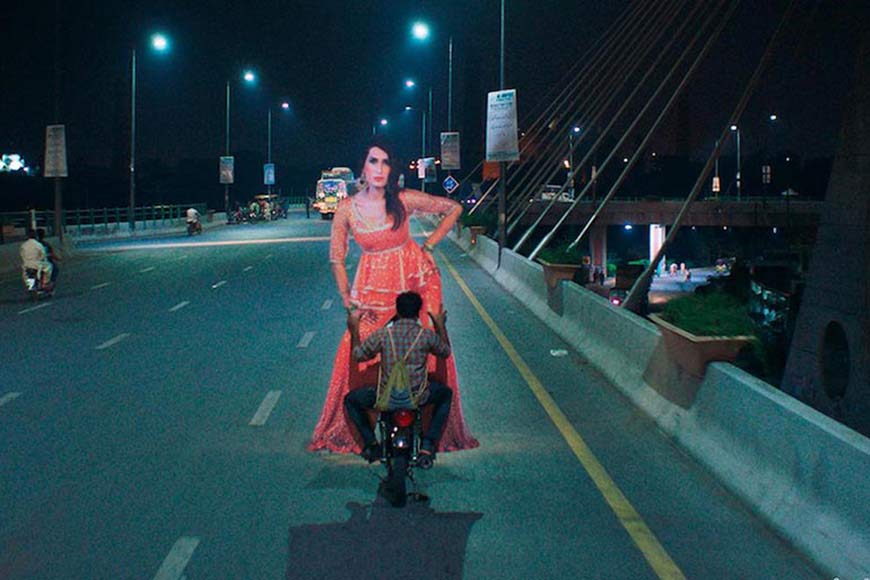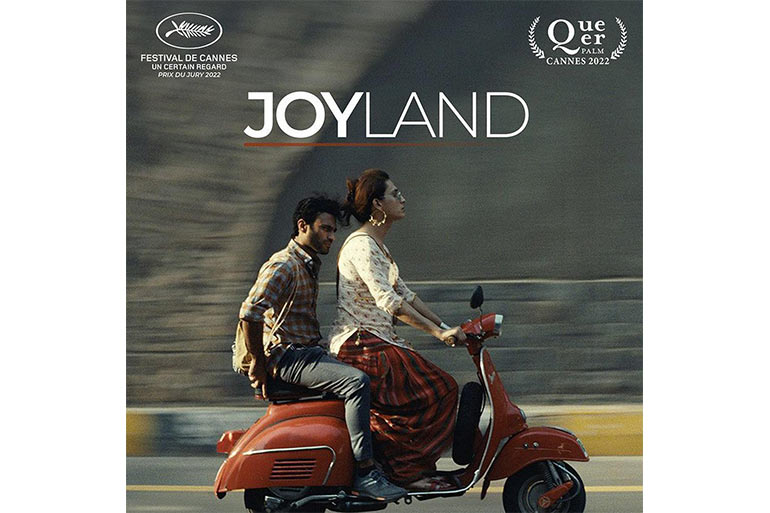Attacked in Pakistan, welcomed in Kolkata, Joyland makes history

To begin with a cliché, some truths are universal. The kind of truth that Pakistani filmmaker Saim Sadiq talks about in his debut film ‘Joyland’. The kind of truth that gives birth to freedom and openness, and pushes for an end to gender discrimination.
Openness of heart and mind is what has enabled the 28th Kolkata International Film Festival to welcome a film from Pakistan, where Indian films and TV shows are still effectively forbidden despite two decisions in favour of lifting the ban by Lahore High Court in 2016 and 2019.

But as Kolkata has proved time and again, art can never be limited by geographical or any other boundaries. It is for this very reason that this city mourns the death of a Kim Ki-Duk, worries about how a Zafar Panahi is doing in prison, and celebrates the Bangladeshi film ‘Haoa’ for months. This openness is what rejuvenates the Bengali psyche, time and time again.
Uncertainty is the other dominant narrative trope here. Haider, Biba, Mumtaz, all face an uncertain future, curiously mirrored by the vastness of the ocean. In one scene set in a darkened room of light and shadow, Biba asks Haider, “Have you ever been to the sea?” When Haider says no, Biba says, “Once you earn a little more money, we’ll go to the seaside in Karachi.”
‘Joyland’ is no exception. Initially banned in 11 states of Pakistan, the film was scheduled to release in its home country on November 18. However, on November 11, Pakistan’s Ministry of Information and Broadcasting declared in a statement: “Written complaints were received that the film contains highly objectionable material which do not conform with the social values and moral standards of our society and is clearly repugnant to the norms of ‘decency and morality’ as laid down in Section 9 of the Motion Picture Ordinance, 1979.”
Happily, Pakistan has since reversed the ban on ‘Joyland’, which is ironically Pakistan’s official submission for the Best International Feature Oscar. The film has now been cleared for theatrical release, though a few cuts are expected. Following the announcement, senior government official Salman Sufi tweeted, “Freedom of speech is (a) fundamental right & should be nourished within ambits (sic) of the law.”
The Oscars are a logical next step following Joyland’s Cannes outing this year, where it was screened as part of the competitive Un Certain Regard section, marking Pakistan’s debut at the premier film festival.
The plot centres around an ordinary middle class family, where the men always have the last word, particularly the wheelchair-bound patriarch. Female babies are given a lukewarm welcome, male babies eagerly awaited. Enter Mumtaz, the youngest daughter-in-law of the family, whose husband Haider works for an erotic dance troupe, and falls in love with troupe leader Biba, a transgender woman.

Unexpectedly, instead of focusing on the ‘patriarchal male falling in love with transgender female’ trope, the film chooses to look at Mumtaz, and the way her mind opens up as she deals with her husband’s infidelity. The humble homemaker, whom familial patriarchy forbids from earning even a basic living, gradually discovers the magic in her mundane, colourless existence. Her journey of self-discovery makes her immune to Haider’s treatment of her, and she dreams of escaping to a solitary life, where she will be liberated from all the shackles that life has imposed on her.
Thus the ostensibly ‘queer narrative’ is transcended by the struggle between Mumtaz’s inner and outer worlds, making a critical point about the state of women in a deeply conservative society. The film’s finely etched characters all revolve around Mumtaz, and Sadiq skillfully draws parallels between the lives of two women – Mumtaz and Biba – so far apart from each other and yet so close in the way they wage war against both society and their own inner selves.

Uncertainty is the other dominant narrative trope here. Haider, Biba, Mumtaz, all face an uncertain future, curiously mirrored by the vastness of the ocean. In one scene set in a darkened room of light and shadow, Biba asks Haider, “Have you ever been to the sea?” When Haider says no, Biba says, “Once you earn a little more money, we’ll go to the seaside in Karachi.” That trip remains a dream, but the film ends with the solitary figure of Haider walking out to the sea, his clothes and bag left abandoned on the beach, symbolic of the trappings that he leaves behind, as Biba and Mumtaz are somehow enmeshed in the crashing waves.
Happily, Pakistan has since reversed the ban on ‘Joyland’, which is ironically Pakistan’s official submission for the Best International Feature Oscar. The film has now been cleared for theatrical release, though a few cuts are expected.
None of Sadiq’s points against patriarchy, transphobia, or the position of women in a seemingly free country are overstated. There are no lectures, no diatribes, and yet, the film stirs up a restlessness within the viewer at the thought of what might have been, what can still be. That is the true revolution that ‘Joyland’ brings about. This is why it will remain a historic feat.

The crowd gathered at Nandan to participate in this making of history comprised viewers of all ages. As the film ended, someone embraced a friend, or an elderly viewer’s eyes filled with tears. This was no mere emotional response to the film, but a deeper reaction to the craving for freedom that an authoritarian social system gives rise to.
Countries like Korea, Iran, Palestine, Iraq, or Syria have consistently surprised us with such powerful and artistic outpourings of the love of freedom among traditionally oppressed societies. Pakistan has thus joined an elite club with an ‘anti-national’ film that Kolkata has embraced.

Starring Ali Juneja as Haider, Alina Khan as Biba and Rasti Farooq as Mumtaz, ‘Joyland’ also features Sarwat Gilani, Salman Peerzada, Sohail Sameer and Sania Saeed, with an outstanding score by Abdullah Siddiqui. Saim Sadiq’s surefooted debut is certain to make its place as a pioneer – for freedom, liberty, and open thought.










